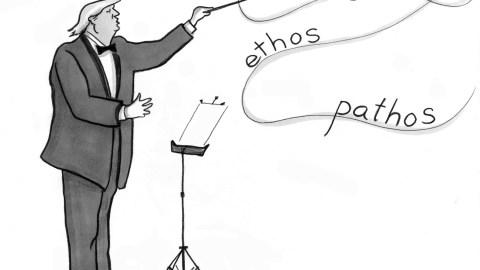What Trump Can Teach Reason-Loving Smart Folks

1. Like him or loathe him, Trump can teach us much. Especially smart folk enthralled by an unempirical faith in logic.
2. Simon Schama calls Trump’s “war against knowledge” the “Enlightenment’s nightmare.” But many Enlightenment fans use “reason” to resist reality (consistently rejecting knowledge about choosing).
3. Covering Democracy for Realists, George Monbiot calls Enlightenment-inspired “rational choice” notions a “folk theory of democracy.” But “rational choice” is a reality-starved elite (not folk) theory.
4. The vast majority of voters can’t rationally choose policy (lacking skills, facts, time, inclination). Providing more facts won’t help—behavioral economists are (re)learning, choosing doesn’t work that way.
5. Trump instinctively gets the “behavioral” gist. Salespeople and marketers were doing behavioral economics long before that field’s arrival (e.g., Rory Sutherland’sinterview, + Mark Thompson’s book).
6. Classic rhetoric long taught “behavioral” skills (modelling human nature better than “rational choice”). Rhetoric isn’t the paintwork, it’s also the engine.
7. Aristotle described 3 keys of persuasion: logos, ethos, and pathos (argument, persona, attuned emotions).
8. As Sam Leith notes logos isn’t ironclad logical deduction, but life’s “fuzzy logic.” Heidegger used a “musical tuning” term for pathos (playing audiences like unruly orchestras).
9. Those who prefer logos-only approaches have lost the plot. Pathologizing appeals to pathos and ethos, abandons all but the weakest persuader.
10. Trump knows that logic alone often won’t sell (and often isn’t needed). Facts often don’t change minds.
11. A logos-driven approach is an empirical error (a logic-intoxicated aspirational “reality-denying” doctrine). It’s self-evident (+measurable) that feelings and prior beliefs shape thinking about new “facts.”
12. Hume’s “Reason Is… the Slave of the Passions,” should enlighten (updated here, here). Passions precede and feed and frame following reason (launching local script logic, often lacking global coherence).
13. However distasteful to reason-seduced logic-lovers, Trump’s politically atypical contradictory ethos helps him orchestrate different pathos-playing tunes (cacophonous coalition).
14. Aren’t we all contradiction-filled? Aren’t many accepted premises contradictory?
15. Smartness confers no immunity (many are educated into “rationalist idiocy”). Elites just play “higher” rhetoric games—e.g., in economics see McCloskey, and Romer.
16. For arguments, as for products, it’s not the best, but the best marketed, with the best rhetoric, that wins. (E.g. “policy formulation has moved from…prose to bullet point and graphic…argument to story“).
17. All brains are biased. Geniuses included. We’re all confirmation seekers and disconfirmation resisters. (Housman called truth seeking “the faintest of all human passions”).
18. Confirmation bias beautifully illustrates a key Enlightenment error. It worsens solo thinking, but can improve collective thinking (see Mercier’s persuasive/“argumentative theory of reasoning”). That collectiveness is vital, our minds evolved for self-deficient, relationally rational, survival.
19. Like its individualism, and rationalism, Enlightenment hedonism is overplayed. Orwell called causes demanding self-sacrifice “psychologically far sounder than any hedonistic” worldview.
20. The Enlightenment’s flight from the supernatural has generated a sub-natural (sub-empirical) view of human nature (our odd mix…hedonistic + self-sacrificing, individual + social, rational + emotional).
21. Such unempirical errors of the Enlightenment now threaten its gifts. Unrealistic reason-intoxicated mind-models enable Trump-like irrational self-maximizers.
Illustration by Julia Suits, author of The Extraordinary Catalog of Peculiar Inventions, and The New Yorker cartoonist.





